Tehran, Beijing Hire Detectives To Spy On Dissidents On US Soil: NYT

Iran and China hired private investigators to spy on opposition figures living in the United State, the New York Times reported Sunday.

Iran and China hired private investigators to spy on opposition figures living in the United State, the New York Times reported Sunday.
The NYT said that authoritarian regimes like the Islamic Republic and China increasingly hire detectives to “surveil, harass, threaten and even repatriate dissidents living legally in the U.S.”
Law enforcement officers have told the Times that during the past two years several complaints have been filed in which private investigators, “mostly unwittingly,” were involved in such schemes in different states.
In one case, the New York-based investigator Michael McKeever,71, received a request on his website to track down a debtor who had fled from Dubai to Brooklyn. However, when McKeever started his task by surveilling a house and taking photos of the people coming and going, the FBI warned him that his clients are “bad people and are up to no good.”
At this point McKeever realized he had been used by the intelligence agents of the Iranian regime to kidnap Masih Alinejad, a well-known Iranian-American activist who has been criticizing Iran’s human rights abuses.
“We were afraid they were going to look to snatch and grab her, bring her home and probably kill her,” said James E. Dennehy, the former head of the FBI’s counterintelligence and cyber division in New York, who now runs the bureau’s Newark office.
The report also reveals some other cases in which PIs unwittingly were used by Chinese agents to set up espionage networks, often focusing on national security targets or on individual dissidents.
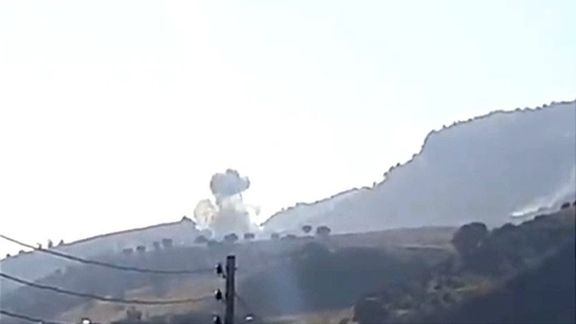
Iran’s Revolutionary Guard’s latest round of shelling of Iraqi Kurdistan region has drawn condemnation by Western countries as well as the Iraqi government.
In a Monday phone call with his Iranian counterpart Hossein Amir-Abdollahian, Iraqi Foreign Minister Fuad Hussein decried the attacks as a violation of Iraq's sovereignty, saying that the continuation of such unilateral measures is "dangerous".
Moreover, Kurdistan Region Prime Minister Masrour Barzani also condemned the “violations” of Iraq and its Kurdish region’s sovereignty, following IRGC’s attacks on the headquarters of Iranian-Kurdish groups, some of which are armed.
According to Iran International’s correspondent, the RGC targeted the main base of the Democratic Party of Iranian Kurdistan (PDKI) in capital Erbil and Komala in Sulaymaniyah with drones and missiles.
The PDKI said a senior party member and a Peshmerga militiaman were killed and several other Peshmerga forces injured in the Monday attacks.
The Canadian Embassy in Iraq, the US Consulate General in Erbil, the UN Assistance Mission for Iraq (UNAMI) and the German Consulate General in Erbil have so far condemned the renewed attacks on the Kurdistan Region.
The German Consulate-General in Erbil said that Berlin urges Iran to respect the territorial integrity and sovereignty of Iraq. “The attacks have to stop immediately,” it said.
Since the current wave of protests began in Iran following the death in custody of young Iranian Kurdish woman Mahsa (Jina) Amini, the Islamic Republic has intensified its attacks on Kurdish dissident groups based in Iraqi Kurdistan, apparently aimed at intimidating the Kurds. In addition to PDKI and Komala, IRGC launched artillery and suicide drone attacks against positions of other Kurdish groups opposed to the Islamic Republic such as Parti Azadi Kurdistan, aka PAK (Kurdistan Freedom Party).
The US also strongly condemned Iran’s “violations of Iraqi sovereignty”, calling on the Islamic Republic to stop attacking its neighbor and the people of Iraq. “We stand with the Iraqi government’s leaders in Baghdad and the Iraqi Kurdistan region,” the Consulate General in Erbil said on its twitter account.
“Iraq should not be used as an arena to settle scores and its territorial integrity must be respected,” UN Assistance Mission for Iraq said, adding that “Dialogue between Iraq and Iran over mutual security concerns is the only way forward.”
Amini was from the Kurdish town of Saqqez and was arrested and beaten during a visit to Tehran. After her death in hospital, her hometown and other Kurdish cities were the first to launch antigovernment protests.
Late in October, the Iranian Army's Ground Force also launched a three-day war game around the northwestern town of Piranshahr in West Azarbaijan province bordering Iraqi Kurdistan.
Iran’s last barrage of missile and drone strikes against the groups in September led to the death of 14 people, including women and children, and wounding of 58 other people near Erbil and Sulaymaniyah.
The Islamic Republic calls the Kurdish armed groups in the western provinces of Iran, "terrorist groups" or "anti-revolutionary" but these groups say that the goal of their armed campaign is "defending the rights of the Kurds".
Generally, the Kurdish parties − including Komala and the KDPI − favor Kurdish autonomy within a federal Iran.
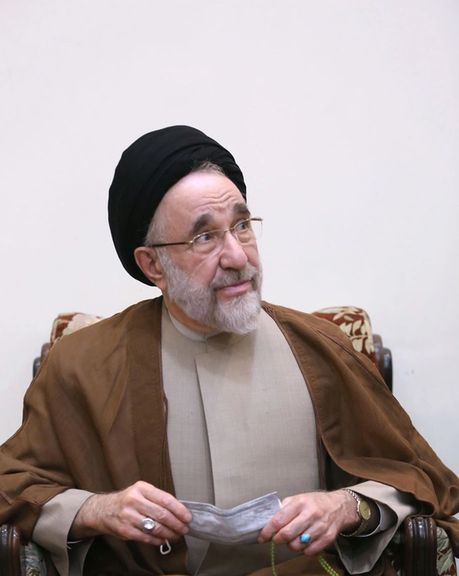
Amid ongoing antigovernment protests, former president and the de-facto leader of Iran’s reformists Mohammad Khatami has spoken against regime change, calling it neither possible nor desirable.
In a message on Monday, the Khatami noted, however, that if the current state of affairs continues, the ground is paved for a looming social collapse.
Expressing regret over the death of "tens of people, many of whom are children and adolescents,” he said the root cause of these “bitter events” is from inside the country, rejecting the official line of Islamic Republic’s propaganda that blames other countries for fomenting the protests.
The current situation is the result of a faulty and incorrect governance mechanism, Khatami noted.
He debunked another claim by the clerical regime that seeks to portray the current wave of protests ignited by the death in custody of Mahsa Amini as fueled by ethnic or religious rivalries and aimed at the balkanization of Iran. “Although the protests started with the unfortunate death of Mahsa Amini (a Kurd), they did not take on an ethnic or religious tone and no separatist voice was heard from it,” he said.
“Ignoring or denying the bad situation that is imposed on people…does not eliminate dissatisfaction,” Khatami said. Misrepresenting the protests as “riots” to justify a harsh response only aggravates the problem, he added.
Earlier in the month, both supporters and opponents criticized Iran’s embattled Reform Front for a statement it issued presenting a double-edged position over current protests.
In October, the spokesman for Iran’s Reform Front, Abolfazl Shakouri-Rad, said a bipolar situation has taken shape in Iranian politics and reformists have been left out of the political debate by both the hardline government and the protesters who do not want an Islamic government.
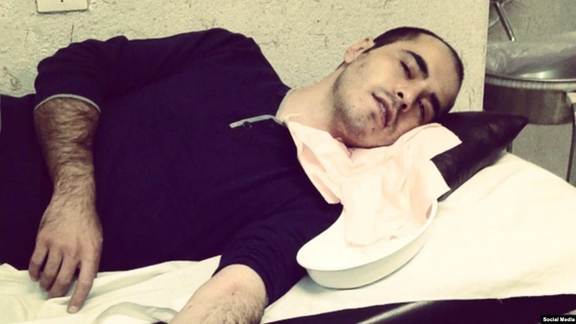
Tehran residents rushed to a hospital Sunday night as news emerged that imprisoned Iranian dissident Hossein Ronaghi had been taken there in a critical condition.
Ronaghi is an Iranian blogger, human rights activist and political dissident who was arrested September 24 along with his lawyers in front of the Evin Prison prosecutor's office and transferred to jail where he was tortured and both of his legs broken.
Ronaghi who has been on hunger strike since his arrest amid antigovernment has refused liquid nourishment and water since Saturday.
Videos on social media show that protesters gathered late Sunday in front of Dey Hospital chanting slogans such as “Death to the Dictator”.
Other videos show police forces firing guns and tear gas to disperse the people gathered in front of the hospital.
People rushed to the hospital after his brother Hassan wrote in a tweet that security agents had moved Ronaghi from prison to a hospital. He said his brother “got on an ambulance fully awake after talking to his mother,” adding “whatever happens to Hossein is nothing more than a pre-planned scenario because they intend to kill him.”
A little later, he wrote in another tweet that agents took Hossein to one of the departments of Dey Hospital adding that they sent out the entire staff and nurses of the ward bringing their own instead.
Following this, the anonymous group called Youth of Tehran's Neighborhoods called on people to gather around Dey Hospital and not let regime forces transfer Ronaghi to an unknown location.
However, based on information received by Iran International, Hossein Ronaghi has been transferred from prison to Sina Hospital in central Tehran.
Reports say he has been at the intensive care unit and cardiac resuscitation was given to him.
Renowned Iranian filmmakers Jafar Panahi and Mohammad Rasoulof, jailed with Ronaghi in Evin, had already expressed concern for his life, warning he could suffer a heart attack at any moment.
Ronaghi, 37, a contributor to The Wall Street Journal, has for years been one of the most fearless critics of the Islamic republic still in the country.
Last week, the paper published and editorial, defending Ronaghi and assailing his detention, saying government accusations that he acted against national security are false.
“His real offense is calling Western attention, including on these pages, to how the regime violates the rights of his compatriots. Mr. Ronaghi refuses to flee Iran, and he surrendered to authorities on Sept. 24 to spare family and friends from the risk of hiding him.” WSJ said expressing concern over his deteriorating health.
In previous rounds of tortures, the dissident has lost one kidney and his second kidney is functioning at 60 percent, according to human rights sources.
Hossein Ronaghi has been arrested and jailed several times in the past 13 years. He was detained in 2009 for his role in the post-election protests. Ronaghi was arrested again in February 2022 after criticizing a bill that would limit internet access in Iran.

Iranian lawmakers who had asked for the execution of detained protesters seem to be backing down, by denying that they sent a letter to the hardliner Judiciary.
On November 6, IRNA News Agency reported that 227 members of the parliament asked the judiciary to deal “decisively with the inciters of the recent riots.”
“In a statement, Iranian lawmakers called for severe punishment of those who incited the recent riots urging Qisas – retaliation in kind—for moharebs,” IRNA reported.
Mohareb, which literally means warrior in Arabic, is used in Islamic law or sharia to mean ‘enemy of God’ which carries the death penalty.
“We, the representatives of this nation, ask all state officials, including the Judiciary, to treat those, who waged war [against the Islamic establishment] and attacked people’s life and property like the Daesh [ISIS], in a way that would serve as a good lesson in the shortest possible time,” state-run Press TV quoted lawmakers as saying.
The statement soon went viral, leaving in its wake a torrent of public criticism both in Iran and abroad. Germany, France and the European Union toughened their positions toward Tehran’s gross violations of human rights, threatening to sanction all the 227 lawmakers.
Abbas Abdi, a reformist politician and pundit in Tehran, slammed the letter saying in a tweet “it was not unexpected that the ones, who have entered the parliament with a low voter turnout, to call for the execution of the protesters.”
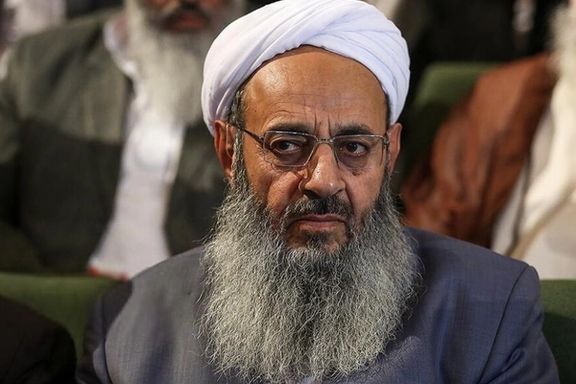
The outspoken Sunni Imam of Zahedan Friday prayer, Molavi Abdolhamid, also called the parliamentarian’s letter “shameful” asking them during his sermon on Friday, “Do other parliaments in the world act the same as you did?”
With criticisms mounting, Asr-e Iran daily said it was heard in the corridors of the parliament that “the MPs did not sign this letter.”
Finally on Saturday, ICANA News Agency, which is affiliated with Iran’s parliament, claimed the letter was “basically fake”.
“In the last few hours, a letter signed by 227 parliamentarians has been published on social media. In this letter, addressed to Chief Justice Gholam-Hossein Mohseni-Eje'i, it has been asked to classify the case of the arrested persons as Moharebeh (War against God). Let it be known that the nature of this letter is based on lies,” added ICANA.
ICANA did not address the question that if the letter was fake, why the official government news agency IRNA reported it.
Hossein Jalali, an MP, told ISNA on Sunday that “I signed a letter to deal with those who committed murder during recent events, but I heard a second letter was signed and published which is fake.”
Jalali’s remarks confirm that a letter signed by him and other lawmakers had the same content, urging judiciary to call protesters ‘mohareb’ and execute them in retaliation.
Seemingly, the strong reaction by EU politicians and their intention to sanction all the signatories of the letter have now forced them to withdraw from their previous hardline position, denying such a letter.
On Thursday, German member of European Parliament, Hannah Neumann, vehemently slammed Iranian lawmakers for demanding the execution of protesters, saying all these MPs must be sanctioned.
On the other hand, signals by officials asking to remove internet restrictions fuels speculation that the clerical regime is showing leniency amid domestic and international pressure.
Two Parliamentarians on Saturday said, “Parliament Speaker Mohammad Bagher Ghalibaf, on behalf of a large number of MPs is pursuing the removal the ban on Instagram and WhatsApp,” adopted after protests began.
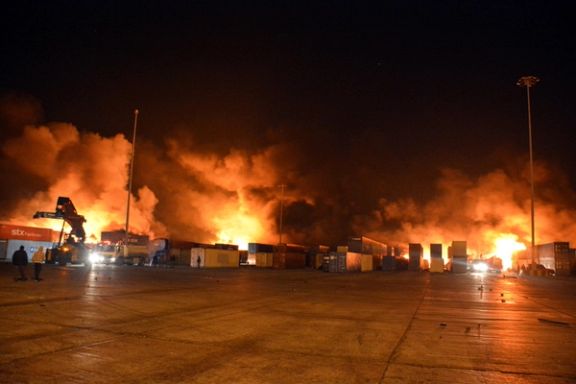
Israeli missiles hit a major air base in Syria's Homs province Sunday, killing two servicemen and injuring three others, the state news agency SANA reported.
Military sources said the air base, at Shayrat, was recently used by the Iranian air force.
Syrian state media posted a short video of the "aggression" and said there were material damages, without elaborating.
One military source, who was not authorized to speak publicly, said the strikes had targeted a runway in the sprawling air base that is located southeast of Homs city.
A spokesperson for the Israeli military refused to comment, although Israel has conducted hundreds of similar strikes since 2017.
The runway and underground facilities at Shayrat, including aircraft shelters, have undergone a major expansion by the Russian military in the last three years, the military source said.
Russia has forces stationed near to Shayrat air base and uses the base, security sources say.
Israel has in recent months intensified strikes on Syrian airports and air bases to disrupt Iran's increasing use of aerial supply lines to deliver arms to allies in Syria and Lebanon including Lebanon's Hezbollah.
The UK-based Syrian Observatory for Human Rights which monitors such events said a warehouse for Iranian militias and Hezbollah in Shayrat air base were destroyed in Sunday's strike.
Opposition sources say Iranian militias hold sway in large swathes of western Homs province near the Lebanese border and to the east where they have a string of bases.
Israel has been mounting attacks in Syria for years against what it has described as Iranian and Iran-backed forces that have deployed there during the war, which began more than a decade ago.
With reporting by Reuters